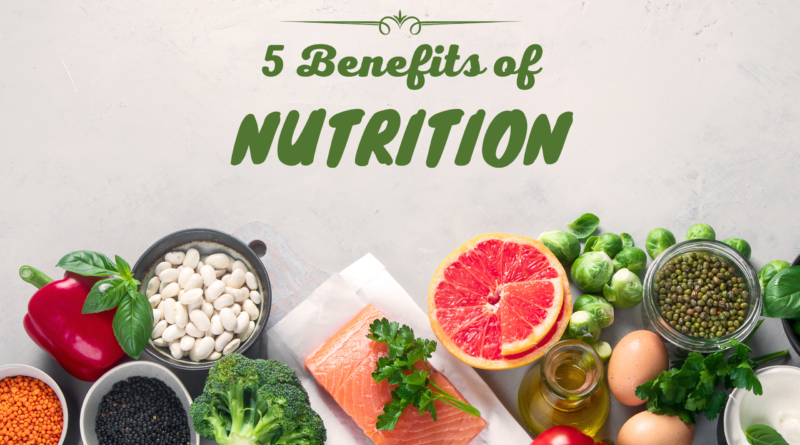What are 5 benefits of nutrition?
Introduction
In our modern, fast-paced lives, the significance of maintaining a balanced and nutritious diet often takes a backseat amidst our hectic schedules. However, the impact of what we choose to consume goes far beyond satisfying hunger. In this comprehensive exploration, we will delve into the intricacies of the five profound benefits that a well-rounded nutritional approach can bring to our lives, offering insights into how nutrition is more than just fuel for our bodies.
Enhanced Physical Health
Good physical health is the foundation of a fulfilling life. A nutrient-rich diet contributes significantly to overall well-being by fortifying the immune system, managing weight effectively, and ensuring optimal bodily functions.
A nutrient-rich diet involves incorporating a diverse range of foods, each packed with essential vitamins, minerals, and antioxidants. These components collectively play a crucial role in strengthening the immune system, providing resilience against illnesses and infections. For instance, Vitamin C is known for its immune-boosting properties, found abundantly in citrus fruits, strawberries, and bell peppers. Additionally, maintaining a well-balanced diet aids in weight control, reducing the risk of obesity-related health issues such as diabetes and cardiovascular diseases.
Cognitive Function Optimization
The brain, being the command center of our body, requires proper nourishment for optimal functioning. Nutrition plays a pivotal role in influencing cognitive function, impacting memory, concentration, and mental clarity.
Essential nutrients like omega-3 fatty acids and antioxidants are instrumental in supporting brain health, potentially reducing the risk of cognitive decline. Omega-3 fatty acids, found in fatty fish, flaxseeds, and chia seeds, contribute to the structural integrity of brain cells. B-vitamins, such as B6 and B12, are crucial for neurotransmitter synthesis, aiding in optimal cognitive function. Consequently, a well-nourished brain operates at its best, leading to improved mental clarity, heightened focus, and overall enhanced cognitive performance.
Sustainable Energy Boost
Ever find yourself feeling sluggish or fatigued during the day? The solution might lie in your dietary choices. Nutrient-dense foods, particularly those rich in carbohydrates, provide sustained energy levels throughout the day.
Opting for nutrient-dense foods ensures a steady supply of energy, preventing sudden crashes. Carbohydrates, being the body’s primary energy source, are essential for maintaining vitality and ensuring sustained physical and mental endurance. Complex carbohydrates, found in whole grains and legumes, release energy slowly, promoting lasting endurance. By focusing on a diet rich in nutrients, individuals can avoid energy fluctuations, promoting consistent and sustained energy levels.
Disease Prevention Shield
Preventive healthcare begins with what we choose to put on our plates. Nutrition, particularly through the intake of antioxidants, plays a crucial role in preventing chronic diseases.
Antioxidants function by neutralizing free radicals, potentially lowering the risk of diseases such as cancer and heart disease. A variety of fruits and vegetables, such as berries, dark leafy greens, and tomatoes, are rich in antioxidants. Scientific evidence further highlights the direct connection between a nutritious diet and a reduced likelihood of developing chronic diseases. Embracing a balanced diet, coupled with other healthy lifestyle habits such as regular exercise and stress management, contributes to an overall approach to well-being and disease prevention.
Emotional Well-being Elevator
Beyond its impact on physical health, nutrition significantly influences our emotional well-being. The foods we consume can directly impact neurotransmitters, affecting mood and mental health.
Certain foods contribute to the production of serotonin, a neurotransmitter associated with mood regulation and emotional well-being. Foods rich in tryptophan, like turkey, chicken, and nuts, aid in serotonin synthesis. The gut-brain connection emphasizes the crucial role of a healthy digestive system in maintaining good mental health. Probiotics, found in yogurt and fermented foods, support gut health and may contribute to improved mood. Additionally, specific nutrients like omega-3 fatty acids, present in fatty fish and walnuts, play a pivotal role in supporting emotional well-being, emphasizing the holistic connection between nutrition and mental health.
Conclusion
In embracing a nutritious lifestyle, we unlock a multitude of benefits that extend far beyond the physical realm. From fortifying our immune system to enhancing cognitive function and promoting emotional well-being, the transformative power of a well-balanced diet is profound. Let’s make conscious choices about what we consume, recognizing the significant impact of nutrition on our overall quality of life.

FAQ’s
How can I start incorporating a nutrient-rich diet into my daily life?
Begin by gradually introducing a variety of fruits, vegetables, whole grains, and lean proteins into your meals. Experiment with new recipes to make the process enjoyable.
Are there specific foods that directly support cognitive function?
Yes, foods rich in omega-3 fatty acids (found in fatty fish, flaxseeds, and chia seeds) and antioxidants (present in berries, dark leafy greens) are known to support cognitive health. Consider including these in your diet regularly.
What role do antioxidants play in disease prevention through nutrition?
Antioxidants neutralize free radicals, reducing the risk of chronic diseases such as cancer and heart disease. Ensure a colorful plate by including a variety of fruits and vegetables to maximize antioxidant intake.
Can nutrition truly impact emotional well-being, and how?
Absolutely. Certain nutrients and foods contribute to the production of serotonin, positively influencing mood and emotional well-being. Incorporate mood-boosting foods like nuts, seeds, and fatty fish into your diet.
Are there practical tips for maintaining a balanced diet in a busy lifestyle?
Yes, plan and prepare meals in advance, choose nutritious snacks, and stay hydrated to ensure a well-balanced diet even in a busy schedule. Prioritize self-care and make mindful choices when it comes to food.
READ: Unhealthy Foods You Should Cut Out


Pingback: Resecurity’s 2024 Cyber Threat Forecast: Deep Dive
Pingback: How do I improve my skin naturally?